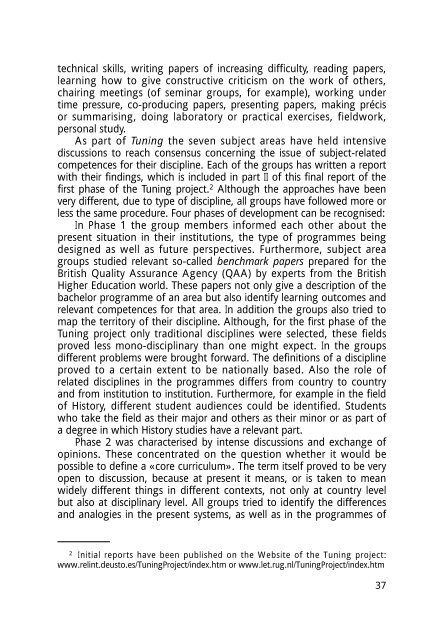Final Report Pilot Project - Relaciones Internacionales de la ...
Final Report Pilot Project - Relaciones Internacionales de la ...
Final Report Pilot Project - Relaciones Internacionales de la ...
You also want an ePaper? Increase the reach of your titles
YUMPU automatically turns print PDFs into web optimized ePapers that Google loves.
technical skills, writing papers of increasing difficulty, reading papers,<br />
learning how to give constructive criticism on the work of others,<br />
chairing meetings (of seminar groups, for example), working un<strong>de</strong>r<br />
time pressure, co-producing papers, presenting papers, making précis<br />
or summarising, doing <strong>la</strong>boratory or practical exercises, fieldwork,<br />
personal study.<br />
As part of Tuning the seven subject areas have held intensive<br />
discussions to reach consensus concerning the issue of subject-re<strong>la</strong>ted<br />
competences for their discipline. Each of the groups has written a report<br />
with their findings, which is inclu<strong>de</strong>d in part II of this final report of the<br />
first phase of the Tuning project. 2 Although the approaches have been<br />
very different, due to type of discipline, all groups have followed more or<br />
less the same procedure. Four phases of <strong>de</strong>velopment can be recognised:<br />
In Phase 1 the group members informed each other about the<br />
present situation in their institutions, the type of programmes being<br />
<strong>de</strong>signed as well as future perspectives. Furthermore, subject area<br />
groups studied relevant so-called benchmark papers prepared for the<br />
British Quality Assurance Agency (QAA) by experts from the British<br />
Higher Education world. These papers not only give a <strong>de</strong>scription of the<br />
bachelor programme of an area but also i<strong>de</strong>ntify learning outcomes and<br />
relevant competences for that area. In addition the groups also tried to<br />
map the territory of their discipline. Although, for the first phase of the<br />
Tuning project only traditional disciplines were selected, these fields<br />
proved less mono-disciplinary than one might expect. In the groups<br />
different problems were brought forward. The <strong>de</strong>finitions of a discipline<br />
proved to a certain extent to be nationally based. Also the role of<br />
re<strong>la</strong>ted disciplines in the programmes differs from country to country<br />
and from institution to institution. Furthermore, for example in the field<br />
of History, different stu<strong>de</strong>nt audiences could be i<strong>de</strong>ntified. Stu<strong>de</strong>nts<br />
who take the field as their major and others as their minor or as part of<br />
a <strong>de</strong>gree in which History studies have a relevant part.<br />
Phase 2 was characterised by intense discussions and exchange of<br />
opinions. These concentrated on the question whether it would be<br />
possible to <strong>de</strong>fine a «core curriculum». The term itself proved to be very<br />
open to discussion, because at present it means, or is taken to mean<br />
wi<strong>de</strong>ly different things in different contexts, not only at country level<br />
but also at disciplinary level. All groups tried to i<strong>de</strong>ntify the differences<br />
and analogies in the present systems, as well as in the programmes of<br />
2 Initial reports have been published on the Website of the Tuning project:<br />
www.relint.<strong>de</strong>usto.es/Tuning<strong>Project</strong>/in<strong>de</strong>x.htm or www.let.rug.nl/Tuning<strong>Project</strong>/in<strong>de</strong>x.htm<br />
37


